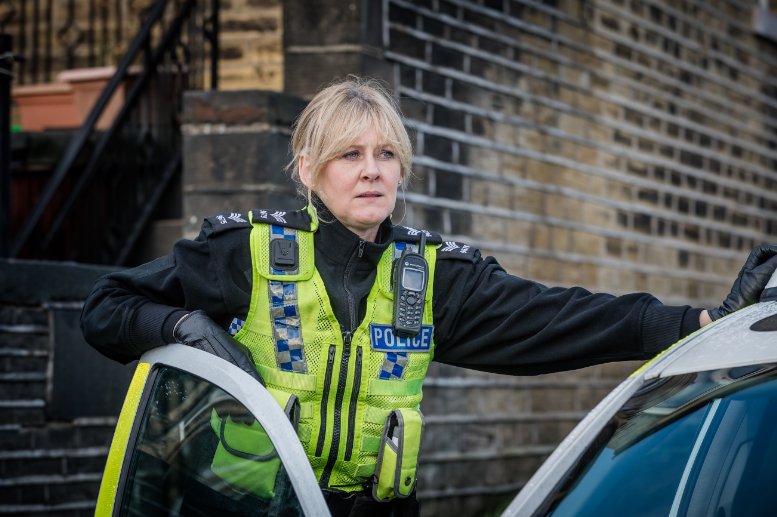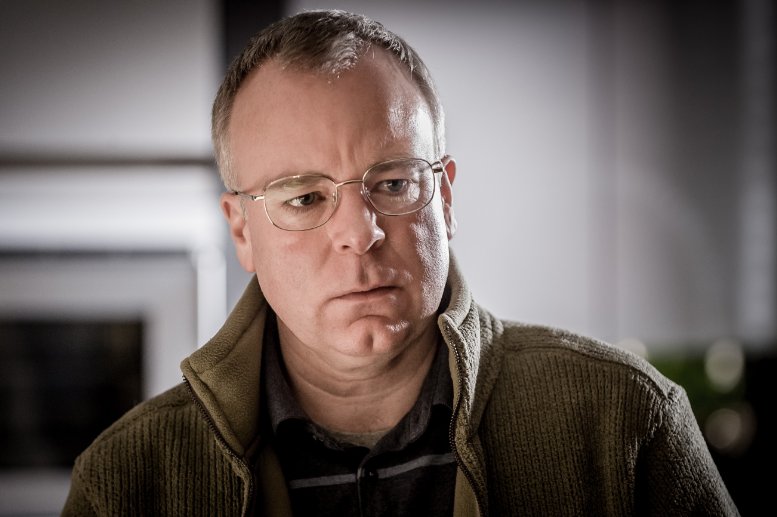
Are good, normal people capable of justifying terrible evil? A recent BBC series (available on Netflix streaming) answers this question in the affirmative.
Happy Valley (2014) stars Sarah Lancashire as Catherine Cawood, a police officer whose daughter was raped (or was she?) years ago by a man who has now just been released from prison (Tommy Lee Royce, played by James Norton). The rape resulted in a pregnancy and then in her daughter’s suicide after the baby’s birth. Catherine has taken in her grandson, despite the fact that almost everyone else in the family rejects him. Because of this decision, her husband divorced her and considerable tension exists between her and her son, Daniel, who feels neglected and ignored. She and her recovered-drug addict sister, Clare (Siobhan Finneran, a beautiful example of warmth and mercy) care for young Ryan together.
Meanwhile, on another front, Kevin Weatherhill (Steve Pemberton), a mid-level manager feels slighted by his boss, Nevison Gallagher’s (George Costigan), refusal to grant him extra salary in order to fund his daughter’s education. In his submerged rage, he hires local drug dealers to kidnap his boss’s daughter, Ann, and hold her for ransom. He says he’s doing it for the money, but, really, it’s so he can stick to his boss.
Of course, the drug dealers Kevin hires to do this horrible act just happen to have recently employed none other than Tommy Lee Royce. Unlike the small-time crooks who are employing him, Royce is a loose cannon, and this bodes badly for Ann and for many others in the surrounding story, including Catherine.
As the plot unfolds, Kevin tries to maintain his innocent, everyman exterior even as he gets more and more in over his head. Like Fargo’s Jerry Lundegaard or Breaking Bad‘s Walter White, Kevin twitches with self-righteousness. He maintains that he had every right to do what he did, that others are to blame for “forcing him” into his choice to kidnap his boss’s daughter. When several tragic circumstances result from Kevin’s instigating actions, he continues to insist that he isn’t responsible! He’s just a good guy trying to get what’s due him!

In an “anti-confession” when Nevison visits Kevin in the jail after the whole thing unravels, Kevin snarls:
Jenny said that the reason you’re illegally withholding my wages is that I have to understand that my actions have consequences for people other than myself. You think it’s my fault your daughter was… [kidnapped]. I asked you for a raise so that I could send one of my daughters to a better school. Considering how comprehensively you ripped my father off, I would’ve thought that wasn’t too much to ask. It would have never occurred to me to suggest kidnapping your daughter to those animals if you’d just said “yes” when I asked! So. You’re right, Nevison. Your actions have had consequences for people other than yourself.
The thing about characters like Kevin Weatherhill, Jerry Lundegaard, and Walter White is that while they are moral monsters, they are not inaccessible monsters. What is really scary about each of these characters (and the Jenny Weatherhills and Skylar Whites of the world also) is that they so very accessible and familiar. Who of us hasn’t wanted to stick it to someone who we felt didn’t give us our due? Who of us hasn’t imagined terrible things happening to such folks–perhaps at our own hand? Who of us hasn’t blamed somebody else for our own poor decisions (“they forced me into it!”)?
What is it at the core of the human heart that is capable both of great evil and great self-justification? Why do we think the other guy is responsible for his actions, while we were perfectly within our rights to do as we did?
In contrast stands Catherine Cawood. She battles her rage, her grief, her anxiety mightily. She pursues justice wildly, sometimes so wildly that she disregards the law or tramples those she loves most. But she also is humble enough to offer a real confession in the last episode of the show. A confession that explains but doesn’t justify her actions. A confession that brings reconciliation.
Do we find ourselves more in the character of Catherine Cawood or in the character of Kevin Weatherhill? Probably most of us find ourselves in both, depending on the situation. From Catherine, we learn the importance of acknowledging our human failures, being willing to confess them humbly and come to reconciliation instead of self-justification.
Because, let’s face it: self-justification is a deep, dark, lonely hole.
Photos by Ben Blackall – © 2014 – Red Production Company Limited. Obtained on IMDB.com.












